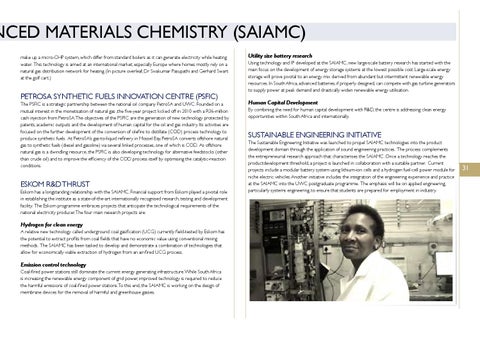NCED MATERIALS CHEMISTRY (SAIAMC) make up a micro-CHP system, which differ from standard boilers as it can generate electricity while heating water. This technology is aimed at an international market, especially Europe where homes mostly rely on a natural gas distribution network for heating. (In picture overleaf, Dr Sivakumar Pasupathi and Gerhard Swart at the golf cart.)
PetroSA Synthetic Fuels Innovation Centre (PSFIC)
The PSFIC is a strategic partnership between the national oil company PetroSA and UWC. Founded on a mutual interest in the monetisation of natural gas ,the five-year project kicked off in 2010 with a R36-million cash injection from PetroSA.The objectives of the PSFIC are the generation of new technology protected by patents, academic outputs and the development of human capital for the oil and gas industry. Its activities are focused on the further development of the conversion of olefins to distillate (COD) process technology to produce synthetic fuels. At PetroSA’s gas-to-liquid refinery in Mossel Bay, PetroSA converts offshore natural gas to synthetic fuels (diesel and gasoline) via several linked processes, one of which is COD. As offshore natural gas is a dwindling resource, the PSFIC is also developing technology for alternative feedstocks (other than crude oil) and to improve the efficiency of the COD process itself by optimising the catalytic-reaction conditions.
Eskom R&D Thrust
Eskom has a longstanding relationship with the SAIAMC. Financial support from Eskom played a pivotal role in establishing the institute as a state-of-the-art internationally recognised research, testing and development facility. The Eskom programme embraces projects that anticipate the technological requirements of the national electricity producer.The four main research projects are:
Hydrogen for clean energy A relative new technology called underground coal gasification (UCG) currently field-tested by Eskom has the potential to extract profits from coal fields that have no economic value using conventional mining methods. The SAIAMC has been tasked to develop and demonstrate a combination of technologies that allow for economically viable extraction of hydrogen from an air-fired UCG process.
Emission control technology Coal-fired power stations still dominate the current energy generating infrastructure.While South Africa is increasing the renewable energy component of grid power, improved technology is required to reduce the harmful emissions of coal-fired power stations.To this end, the SAIAMC is working on the design of membrane devices for the removal of harmful and greenhouse gasses.
Utility size battery research Using technology and IP developed at the SAIAMC, new large-scale battery research has started with the main focus on the development of energy storage systems at the lowest possible cost. Large-scale energy storage will prove pivotal to an energy mix derived from abundant but intermittent renewable energy resources. In South Africa, advanced batteries, if properly designed, can compete with gas turbine generators to supply power at peak demand and drastically widen renewable energy utilisation.
Human Capital Development By combining the need for human capital development with R&D, the centre is addressing clean energy opportunities within South Africa and internationally.
Sustainable Engineering Initiative
The Sustainable Engineering Initiative was launched to propel SAIAMC technologies into the product development domain through the application of sound engineering practices. The process complements the entrepreneurial research approach that characterises the SAIAMC. Once a technology reaches the productdevelopment threshold, a project is launched in collaboration with a suitable partner. Current projects include a modular battery system using lithium-ion cells and a hydrogen fuel-cell power module for niche electric vehicles.Another initiative includes the integration of the engineering experience and practice at the SAIAMC into the UWC postgraduate programme. The emphasis will be on applied engineering, particularly systems engineering, to ensure that students are prepared for employment in industry.
31
